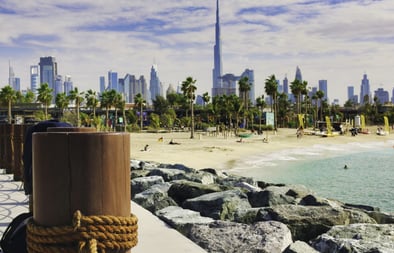Car insurance in Dubai is a critical component of vehicle ownership that serves multiple important functions. Firstly, it is a legal requirement mandated by the Roads and Transport Authority (RTA) to ensure that all drivers have the necessary coverage to handle the financial repercussions of accidents. This mandate underscores the importance the government places on safety and responsibility on the roads. Secondly, car insurance provides invaluable protection and peace of mind to vehicle owners. It safeguards them against the potentially high costs of repairs, medical expenses, and legal liabilities that can arise from accidents or other unforeseen incidents.
For both long-term residents and newcomers to Dubai, navigating the car insurance landscape can seem daunting. The city’s vibrant and fast-paced environment, combined with its unique driving conditions, necessitates a thorough understanding of how car insurance works. This guide is designed to demystify the process, offering a detailed overview of the various aspects of car insurance in Dubai. Whether you are unfamiliar with the concept or looking to optimize your existing coverage, this guide will provide you with the necessary knowledge to make informed decisions.
We will delve into the different types of car insurance coverage available in Dubai, explaining the distinctions between basic third-party liability and comprehensive policies. Each type offers varying degrees of protection, and choosing the right one depends on your specific needs and circumstances. Additionally, we will explore the numerous factors that influence car insurance premiums. Understanding these factors can help you anticipate costs and find ways to reduce your premiums without compromising on coverage.
Choosing the right car insurance policy is a critical decision that can have long-term implications. This guide will offer practical tips and insights to help you select a policy that not only complies with legal requirements but also provides optimal protection and value for money. From assessing your coverage needs to comparing quotes and understanding policy terms, we will cover all the essential steps to ensure you are well-equipped to make the best choice.
In summary, car insurance in Dubai is more than just a legal formality; it is a fundamental aspect of responsible vehicle ownership. By understanding the types of coverage, the factors affecting premiums, and the process of choosing a policy, you can ensure that you are adequately protected on the road. This comprehensive guide aims to equip you with all the information you need to navigate the world of car insurance in Dubai confidently and effectively.
Why Car Insurance is Essential in Dubai
Car insurance plays a critical role in Dubai due to the dynamic nature of its roads and traffic conditions. Despite the city's reputation for well-maintained infrastructure, accidents and unforeseen incidents are not uncommon. These incidents can range from minor fender benders to more serious collisions, theft, or damage caused by natural disasters.
The primary purpose of car insurance is to provide financial protection in such situations. Without insurance, individuals would be personally liable for covering the costs of repairs or replacements for their vehicles and potentially for damages or injuries caused to others. In a city like Dubai, where the cost of living and vehicle ownership can be high, these expenses can quickly become overwhelming.
Car insurance helps mitigate these financial risks by covering various scenarios, including damages from accidents, theft of the vehicle, vandalism, fire, and damages caused by natural disasters like floods or storms. It also extends to cover liability costs if the insured person is responsible for causing harm to others or damaging their property. This liability coverage is crucial, as it can help individuals avoid substantial legal fees, settlements, and other expenses associated with such incidents.
Legal Requirements
In Dubai, having car insurance is mandatory by law. Driving without valid insurance can result in severe penalties, including fines, vehicle impoundment, and even legal action. The Roads and Transport Authority (RTA) mandates that every vehicle on the road must be insured to ensure the safety of all road users.
Types of Car Insurance Coverage
Dubai offers several types of car insurance policies to cater to different needs and preferences. The two main types are:
1. Third-Party Liability Insurance
This is the minimum level of coverage required by law in Dubai. It covers damages and injuries you cause to third parties, including other vehicles, property, and people. However, it does not cover any damages to your own vehicle or injuries you may sustain.
Key Features:
• Covers legal liability for injuries to third parties
• Covers damages to third-party property
• Does not cover own vehicle damages or personal injuries
2. Comprehensive Insurance
Comprehensive insurance provides broader coverage, including third-party liability and damage to your own vehicle. This type of policy is ideal for those seeking extensive protection and peace of mind.
Key Features:
• Covers damages to your own vehicle due to accidents, theft, fire, and natural disasters
• Includes third-party liability coverage
• May offer additional benefits like roadside assistance, agency repairs, and personal accident cover
Factors Influencing Car Insurance Premiums
The calculation of car insurance premiums in Dubai is influenced by a multitude of factors, each contributing to the overall cost. By delving into these factors, you gain insight into the intricacies of insurance pricing, enabling you to make well-informed choices that suit both your financial capabilities and coverage preferences.
1. Driver's Profile
• Age: Younger drivers (under 25) typically pay higher premiums due to their perceived higher risk.
• Experience: Experienced drivers with a clean driving record may benefit from lower premiums.
• Nationality: Some insurers consider the driver’s nationality as a risk factor.
2. Vehicle Specifications
• Make and Model: High-end luxury cars and sports cars generally have higher premiums due to the cost of repairs and parts.
• Age of the Vehicle: Older cars might attract lower premiums but could have higher excess fees.
• Engine Size: Vehicles with larger engines often have higher insurance costs.
3. Coverage Type
• Comprehensive vs. Third-Party: Comprehensive insurance costs more than third-party liability due to the extensive coverage it offers.
• Add-Ons and Extras: Optional coverages like roadside assistance, rental car coverage, and off-road coverage can increase premiums.
4. Claims History
• No-Claims Discount (NCD): Drivers with no claims history can benefit from discounts on their premiums.
How to Choose the Right Car Insurance Policy
Selecting the right car insurance policy in Dubai involves evaluating your needs, comparing different policies, and considering the following factors:
1. Assess Your Coverage Needs
Determine whether you need basic third-party liability coverage or a more comprehensive plan. Consider the value of your vehicle, your driving habits, and your budget.
2. Compare Quotes
Use online comparison tools or consult with insurance brokers to compare quotes from multiple insurers. This helps you find competitive rates and the best coverage options.
3. Read the Policy Terms
Carefully review the policy terms and conditions, including exclusions, deductibles, and coverage limits. Ensure you understand what is covered and what is not.
4. Consider Add-Ons
Evaluate additional coverages like personal accident cover, roadside assistance, and agency repair. These add-ons can provide extra protection and convenience.
5. Check the Insurer’s Reputation
Research the insurer’s reputation, customer service, and claim settlement process. Opt for a reliable company with a strong track record in the industry.
Steps to Apply for Car Insurance in Dubai
Applying for car insurance in Dubai is a straightforward process. Here’s a step-by-step guide:
1. Gather Required Documents
Prepare the necessary documents, including:
• Emirates ID
• Driver’s license
• Vehicle registration (Mulkiya)
• Previous insurance policy (if applicable)
2. Request Quotes
Contact insurance companies or use online platforms to request quotes based on your coverage needs and vehicle details.
3. Compare and Select a Policy
Compare the quotes and coverage options, then select the policy that best suits your requirements.
4. Submit Application
Submit the completed application form along with the required documents to the chosen insurer.
5. Make Payment
Pay the insurance premium through the insurer’s preferred payment methods. Some insurers offer installment plans for convenience.
6. Receive Policy Documents
Once the payment is processed, you will receive your insurance policy documents. Keep these documents safe, as you may need them for registration and in case of claims.
Making a Claim
In the event of an accident or damage to your vehicle, knowing how to make a claim is essential. Here’s what to do:
1. Report the Incident
If you're involved in an incident like an accident or theft, it's crucial to report the incident to the police immediately and obtain a police report. In Dubai, this is a mandatory requirement for filing an insurance claim. The police report provides official documentation of the incident, including details of what happened, any injuries, damages, or losses incurred, and the parties involved. It's essential to gather this information as it serves as crucial evidence during the insurance claim process.
2. Contact Your Insurer
In the event of an incident, such as an accident or theft, it's crucial to contact your insurance company promptly. Inform them about the incident and provide any required documentation, such as the police report, photographs, and details of the damages or losses. This timely communication allows the insurer to assess the situation and guide you through the claims process efficiently.
3. Submit a Claim
To initiate a claim with your insurer, you'll need to fill out the claim form they provide. Along with the form, submit the required documents, which typically include a police report (if applicable), photographs of the damage, and repair estimates from approved garages or service centers. Providing accurate and complete information will help expedite the claims process and ensure that your claim is processed smoothly.
4. Inspection and Approval
After reporting the damage to your insurer, they will arrange for an inspection of your vehicle to assess the claim. Once the inspection is completed and the claim is approved, you'll receive instructions on how to proceed with the repair process. This ensures that the repair is carried out smoothly and in accordance with your insurance policy.
5. Repair and Settlement
When your vehicle requires repairs, it's important to take it to an approved garage or service center recommended by your insurer. This ensures that the repair costs are covered as per the terms of your policy, giving you peace of mind and avoiding potential disputes with the insurer.
Tips for Lowering Your Car Insurance Premiums
1. Maintain a Clean Driving Record
Maintaining a clean driving record by avoiding traffic violations and accidents can lead to lower insurance premiums and potential no-claims discounts. Insurers often reward safe driving behavior with reduced rates, making it beneficial to drive responsibly.
2. Choose a Higher Deductible
Choosing a higher deductible can lower your premium costs. However, it's crucial to make sure you can comfortably afford the deductible amount in case you need to make a claim.
3. Bundle Insurance Policies
Consider bundling your insurance policies, such as home and health insurance, with the same insurer to potentially receive a bundled discount. Many insurers offer reduced rates when you combine multiple policies under one provider, saving you money overall.
4. Install Safety Features
Adding safety features such as anti-theft devices, alarms, and GPS tracking to your vehicle can lead to potential discounts on your insurance premium. These features reduce the risk of theft or damage, making your vehicle safer and more secure, which insurers often reward with lower premiums.
5. Pay Annually
Paying your car insurance premium annually instead of in monthly installments can often save you money, as many insurers provide discounts for upfront payments. This means you'll pay a lower overall amount for the same coverage.
Conclusion
Several factors influence car insurance premiums in Dubai. These include your driving history, the type and age of your vehicle, your age and experience as a driver, and even your credit score. Insurers assess these factors to determine the risk associated with insuring you and to calculate your premium accordingly. For instance, a clean driving record can lead to lower premiums, while a history of accidents may result in higher costs. Understanding these factors can help you find ways to reduce your premiums.
Choosing the right policy involves more than just comparing prices. You need to consider the coverage limits, exclusions, and additional benefits offered by different insurers. Look for policies that provide the best value for your specific situation. It’s also beneficial to read customer reviews and ratings to gauge the insurer’s reputation for customer service and claims handling. A policy might seem affordable initially, but poor service or complicated claims processes can negate its benefits.
Making claims can be a daunting process, but understanding the steps involved can make it smoother. Familiarize yourself with the claims procedure of your chosen insurer, including the documentation required and the timeline for processing claims. Promptly reporting accidents and providing accurate information can expedite the process. Some insurers offer online claims filing and tracking, which can add convenience.








































